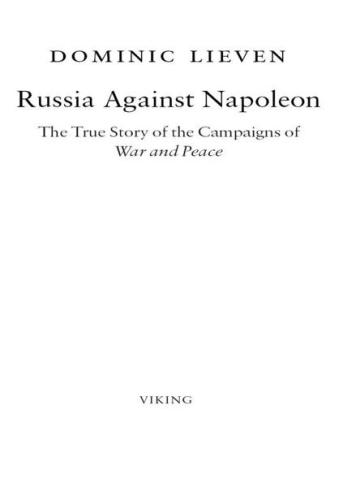
Russia Against Napoleon
The True Story of the Campaigns of War and Peace
کتاب های مرتبط
- اطلاعات
- نقد و بررسی
- دیدگاه کاربران
نقد و بررسی

Starred review from February 8, 2010
Lieven, professor of history at the London School of Economics, uses Russian archives as the basis for this seminal reinterpretation of Napoleon’s defeat in 1812-1814. Russia’s leaders cleverly engaged Napoleon in a kind of drawn-out campaign the French system was least able to wage. Russia’s armies outfought Napoleon’s, thanks in good part to the “courage, endurance, and loyalty” of soldiers led by officers whose central virtues were honor and courage. Russian staffs and administrators kept the troops supplied despite the long and increasing distances between bases and theaters of operations. And coordinating the effort was Tsar Alexander II, whose “courage, skill, and intelligence”held together the final alliance against Napoleon all the way from Moscow to Paris. Lieven weaves these threads together with flair and offers insight into the specifics of everything from infantry tactics to diplomatic negotiations. He concludes that Russian and European security were mutually dependent, and that Russia’s war was seen by Europeans a one of liberation from Napoleon’s exactions and ambitions. While debatable, neither point can be dismissed. Illus., maps.

February 15, 2010
This is the story of Napolon's invasion of Russia in 1812, but addressed here primarily from the Russian viewpoint. Using Russian military archives only accessible to Western researchers since 1991, Lieven (Russian history, London Sch. of Economics) studies the Russian war effort against Napolon, most familiar to readers either through British and French historians or through Tolstoy's renditions in "War and Peace". Lieven begins with the Treaty of Tilsit in 1807 and ends with the triumphant Russian entry into Paris in 1814, describing the longest military campaign in European history in an engaging narrative, without the embellishments of Tolstoy in "War and Peace" (Tolstoy is barely covered here, in spite of the subtitle's implication) or the usual Western prejudices. Among Lieven's points are that a certain percentage of senior officers serving in the Russian army were foreign born (mostly from the Baltic States), and that the Russian mobilization was not only extremely large but also extremely cheap, with the troops being given raw cloth and told to go and make their own uniforms. VERDICT Highly recommended for all who study this era of European and Russian history, or keep up with Napoleonic studies.David Lee Poremba, Keiser Univ., Orlando, FL
Copyright 2010 Library Journal, LLC Used with permission.

April 1, 2010
For this groundbreaking contribution to the study of Napol'ons demise, historian Lieven researched once-forbidden Russian archives to tell the story from Emperor Alexander Is point of view, and from the perspectives of his officers and soldiers. Its a military history of how the Russian Imperial Army was raised, organized, equipped, and strategically conducted on its retreat to Moscow in 1812 and advance to Paris in 181314. Integrating Russian diplomatic estrangement with France, the enigmatic personality of Alexander, and the political characteristics of the multiethnic empire of nobles and serfs that he ruled, Lieven vividly dramatizes Russian preparations for receiving Napol'ons invasion, especially the contentious relations among the monarchs commanders. If the Russian army barely hung on in 1812, suffering greatly though not as disastrously as the French, it displayed remarkable recuperation and martial improvement in the ensuing pursuit across Europe, as Lieven fluidly develops with attention to logistics (procurement of horses, particularly) as well as in narratives of campaigns and battles. On the ever-popular topic of the Napoleonic Wars, Lievens distinctive achievement is a must-have.(Reprinted with permission of Booklist, copyright 2010, American Library Association.)

























دیدگاه کاربران